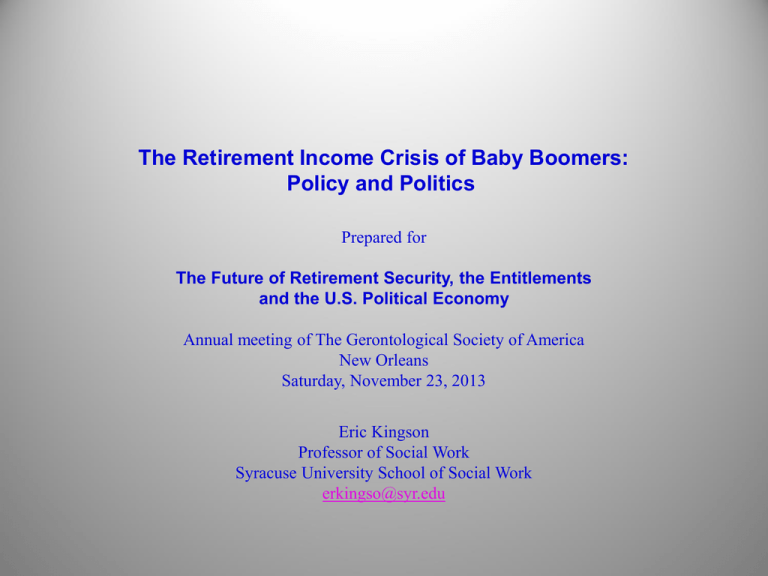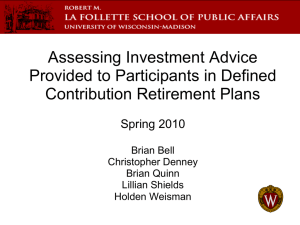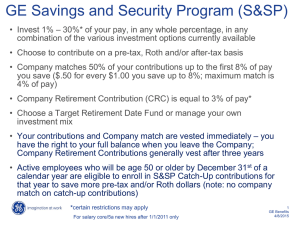Retirement Income Crisis and Baby Boomers
advertisement

• The Retirement Income Crisis of Baby Boomers: Policy and Politics Prepared for The Future of Retirement Security, the Entitlements and the U.S. Political Economy Annual meeting of The Gerontological Society of America New Orleans Saturday, November 23, 2013 Eric Kingson Professor of Social Work Syracuse University School of Social Work erkingso@syr.edu Modest shift in the politics of Social Security: With implications for Baby Boomers & those who follow Evidence of shift Why this is happening now Why Social Security is the “Solution” One expansion plan Evidence of shift? Until now, framed almost exclusively as “every knows…” Choice: How much to cut? Strong, growing opposition to benefit cuts – Labor, Netroots, Aging, Women’s, Veterans, other Chained-CPI – Subtle change in way press explains Chained-CPI – May be becoming “toxic” (e.g., Steve Forbes) Growing number of congressional champions Expansion bills Slow legitimization of expansion as requiring serious discussion Modest changes in how mainstream treats issue (e.g., NY Times, MSNBC, Washington Post) Bills & growing number of sponsors • Strengthen Social Security Act of 2013 S 567 (Sen. Harkin/Sen. Brown)- 3 HR 3118 (Rep. Sanchez (CA)) - 40 • Protecting and Preserving Social Security Act S 308 (Sen. Begich)- 2 HR 649 (Deutch)- 27 • Keeping Our Social Security Promises Act S 500 (Sen. Sanders)- 11 HR 1029 (Rep. DeFazio)- 30 • Social Security Enhancement and Protection Act of 2013 HR 1374- (Rep. Gwen Moore) - 1 “America’s overall retirement system is in big trouble. There’s just one part of that system that’s working well: Social Security. And this suggests that we should make that program stronger, not weaker… Realistically, Social Security expansion won’t happen anytime soon. But it’s an idea that deserves to be on the table — and it’s a very good sign that it finally is.” (Paul Krugman, 11/22/13) “The conversation about retirement and Social Security benefits is not just a conversation about math. At its core, this is a conversation about our values. It is a conversation about who we are as a country and who we are as a people…” “This is the moment when we talk about expanding Social Security.” (Sen. Elizabeth Warren 11/18/13 Senate Speech & Rachel Maddow Show) Why this happening now Favorable organizational and political changes Real Retirement Income Crisis Why this is happening now Labor’s all in Electronic advocacy groups Traditional advocacy groups Creating a “Buzz” about Expanding Benefits • • • • • • • • Organizations put forth proposals Social Security Modernization Commission Women’s & Center for Community Change Latinos for Secure Retirement IWPR/NCPSSM/NOW Social Security Works Alliance for Retired American field focus October 31 Conference on expanding protections Growing number of Congressional champions New Senate and House Proposals Protecting & expanding SS: Good Policy, Good Politics Indicators of Retirement Income Crisis 2/3rds unable to maintain standard of living in retirement (NRRI) $6.6 trillion retirement income gap, ages 32-64 (Pension Rights Center) Declines in household wealth from $66 trillion in 2007 to $58 trillion in 2011 Median income of households “headed” by person 55-64 dropped from $61,700 in 2009 to $58,626 in 2012 “38.3 million working-age households (45%) do not have any retirement account assets” (NIRS) “Four out of five working households have retirement savings less than one times their annual income” (NIRS) 54% of 45-54 report being “totally unprepared for retirement” (2011 Alliance Life Insurance Survey) Declining confidence in ability to afford retirement Surveys show very low confidence in ability to afford comfortable retirement Causes of Retirement Income Crisis Failure of 401 (k) system & Loss of defined benefit plans Social Security Benefit cuts resulting in declining Social Security Replacement Rates (even lower when Medicare Premiums counted) Loss of home equity Stagnant wages Health care costs Retirement Plan Participation trends show a shift from defined-benefit pensions to defined-contribution plans Source: “Chart of the Day: Our Vanishing Home Equity,” Business Insider , May 15, 2009 Why Social Security is the Solution The one part of the retirement income system that is working Most realistic mechanism for addressing crisis The nation can afford to address expand Social Security retirement income and family protections while addressing projected shortfall A matter of values & politics, not economics Source: Social Security Administration, Income of the Aged Chartbook, 2010 http://www.ssa.gov/policy/docs/chartbooks/income_aged/2010/iac10.pdf Increased work effort at older ages A partial “solution” for some Source: Federal Interagency Forum on Aging-Related Statistics, Older Americans 2012: Key Indicators of Well-Being Four Points • • • • Social Security as solution Financing is a means, not an end Nation can afford to strengthen Values matter Social Security Works All Generations Plan • Addresses Nation’s Retirement Income Crisis • Strengthens Family Protections • Secures Social Security’s Financing Social Security Works All Generations Plan 1 Current projected 75 year shortfall as a percent of taxable payroll 2 -2.72 Cost/Savings Addressing the Retirement Income Crisis as percent of taxable payroll 10% benefit increase up to a maximum of $150 a month for current & future beneficiaries More accurate inflation adjustment (CPI-E) Enhance minimum benefit to 125% of poverty at full retirement age with 30 years of work -1.20 -.37 -.19 Strengthening Family Protections for All Generations Up to 12 weeks paid family leave upon the birth/adoption, illness of family member or worker Up to 5 years of caregiver credits for parents <6 Restore student benefits for disabled/deceased workers’ children New child benefit of $1,000 Exempt from Family Maximum families of disabled adult children not living at home Strengthen disabled widow(er)s benefits (eliminate age 50 & 7-year rules; provide unreduced benefits) -.40 -.25 -.07 -.07 -.01 -.04 Securing Social Security’s Financing for Generations to Come Gradually eliminate “the cap” over 10 years, giving credit for contributions Dedicated 10% marginal income tax rate on yearly incomes in excess of $1,000,000 Treat all salary plans the same as 401(k) plans Raise employer & employee payroll tax contribution rate to 7.2% over 20 years Invest 40% of trust funds in equities, phased in over 15 years Long-range surplus 1 2 These estimates are preliminary and do not include the interaction effects. “Percent of taxable payroll” is the customary way of showing the projected deficits/surplus and cost/savings generated by various proposals over 75years +1.95 +1.50 +.25 +1.41 +.59 +0.38








